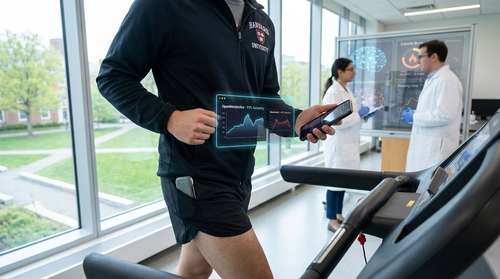Have you ever wondered if there's a secret weapon in the fight against cancer? Something as simple as exercise might just be the key. A recent study suggests that regular physical activity can significantly reduce cancer progression and mortality rates. Imagine that—a natural intervention that doesn't involve a prescription or a hospital visit, just a pair of sneakers and a commitment to move.
Let's dive into the world of exercise and cancer, and explore why getting active could be one of the best decisions for anyone battling this disease. From barre classes to calisthenics, the options are endless, but the benefits are undeniable!
The Science Behind Exercise and Cancer
Why does exercise have such a profound impact on cancer progression? It's all about the body's response to physical activity. When you engage in moderate to high levels of exercise, your body undergoes numerous beneficial changes. These changes can potentially thwart cancer's advance, much like how a solid defense line keeps the opposing team from scoring.
Exercise boosts your immune system, helping it to fight off cancer cells more effectively. It also reduces inflammation, which is often linked to cancer progression. Ever heard the saying, "an apple a day keeps the doctor away"? Well, regular exercise might just be the apple in the world of cancer prevention.
Moreover, physical activity helps regulate hormones that can fuel cancer growth. For instance, exercise reduces levels of insulin and estrogen, which are known to play a role in certain types of cancer. It's like turning down the volume on a blaring radio—everything becomes more manageable.
Real-Life Stories: Exercise in Action
Let's talk about real people making real changes. Take Sarah, for instance. After being diagnosed with breast cancer, she decided to incorporate Pilates into her routine. She found a "pilates near me" class and committed to attending twice a week. Not only did she notice improvements in her physical health, but her mental health soared too. She felt empowered, like she was actively participating in her recovery.
Then there's Mike, who found solace in a local gym. Typing "fitness gyms near me" into his search engine led him to a community that supported him throughout his journey. He started with simple stretching exercises and gradually moved to more intense workouts. His favorite? The "hip thrust"—a move that not only strengthened his body but also his resolve.
Finding Your Fitness Fit
Feeling inspired to start your own fitness journey? The first step is finding an activity you enjoy. Whether it's a "barre near me" class, a brisk walk in the park, or even some good old-fashioned "calisthenics" at home, the options are endless. The key is consistency.
If you're new to exercise, consider starting with something gentle. Stretching can be a fantastic way to ease into physical activity while providing numerous health benefits. It's like dipping your toes into the water before diving in.
On the hunt for a supportive environment? "Planet Fitness near me" might just be your go-to. With a judgment-free zone, you can focus on what truly matters—your health and well-being.
The Psychological Boost of Exercise
Ever notice how a good workout can lift your spirits? Exercise releases endorphins, those feel-good hormones that can chase away the blues. For cancer patients, this psychological boost can be a game-changer. It transforms exercise from a chore into a powerful tool for mental health improvement.
Imagine battling the stress and anxiety of cancer treatment with the power of movement. Like a warrior picking up a shield, exercise offers protection against the mental toll that cancer can take.
Setting Realistic Goals
It's easy to get caught up in the excitement and set lofty goals. "I'll run a marathon by next month!" But hold on—let's keep it real. Start small and build up gradually. Setting achievable goals is crucial for maintaining motivation and avoiding burnout.
Think about what fits into your life. Maybe it's a daily walk around the block or a few sessions at the local "workout gyms near me" each week. The important thing is to keep moving forward, one step at a time.
Exercise: A Complementary Approach
Exercise isn't a standalone treatment; it's a complementary approach to traditional cancer therapies. When combined with treatments like chemotherapy or radiation, exercise can enhance their effectiveness and help manage side effects.
Consider it an ally in your corner, supporting you throughout your journey. It's not about replacing medical treatments but about adding another layer of defense. Like having a trusted friend by your side, exercise enhances your overall strategy for tackling cancer.
Healthcare providers are increasingly recognizing the importance of integrating exercise into cancer care. They see it as a valuable component of a holistic approach to treatment. So, don't hesitate to discuss exercise options with your medical team.
The Future of Cancer Care: Exercise as Standard Practice?
Could exercise become a standard part of cancer care in the future? Many experts believe so. With growing evidence of its benefits, the medical community is starting to view exercise as an essential part of cancer management.
Imagine a world where exercise prescriptions are as common as medication prescriptions. Where "fitness clubs near me" are bustling with cancer patients finding strength and hope through movement. It's a future that's not too far off.
As more research emerges, healthcare systems may increasingly emphasize the role of exercise in cancer care. It's an exciting prospect that could redefine how we approach cancer treatment.
Takeaway: Make Exercise Your Ally
The journey with cancer is undeniably challenging, but exercise offers a beacon of hope. It's more than just a physical activity; it's a source of empowerment and resilience. By embracing movement, you're not just fighting cancer—you're reclaiming your life.
So why wait? Whether it's a quick search for "fitness clubs near me" or simply dusting off your sneakers, take that first step. Your future self will thank you for it!




